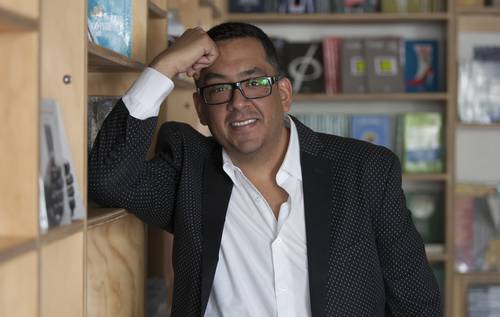The poet, essayist and translator Hernán Bravo Varela (Mexico City, 1979) presents in the same volume two works that explore the intersection between the personal and the collective, between poetry and historical reflection.
Breathing exercises y The Mexican business state They show how language, memory and the body can become key tools to decipher the deepest human crises.
Published by the Alacena Bolsillo label, this edition addresses both a thematic interest and a formal search, in which the poem is constructed as a living organism, with rhythms and pauses that establish a visceral dialogue with the reader.
“Breathing exercises arose from the desire to intertwine poetry with the most essential experiences of existence. Each poem, structured as a stage of samsara – a cycle of reincarnations in Eastern philosophy – traces a journey towards a suspicion of nirvana,” said Bravo Varela in an interview with The Day.
The poem is the body itself, a mirror that reflects our internal tensions and the constant movement of language. I wanted each verse to breathe, to have its own rhythm and silence, because those silences are as important as the words themselves.
added the author.
This approach led him to explore how the graphic design of the poem can generate visual pauses, creating a space where the reader not only reads, but also feels the beats of each page.
The influence of Eastern philosophy, particularly samsara, runs organically through this text. Each stage of breathing – a structural axis in the poems – finds an echo in meditative practices and the search for balance.
New ways of conceiving silence
For Hernán Bravo Varela, this process marked both his writing and his own poetic exploration, allowing him to discover new ways of conceiving silence and rhythm in language.
While Breathing exercises invites a poetic exploration of the body and language, The Mexican business state It delves into the depths of memory and grief. This last text, which Bravo Varela describes as an elegy for his father, combines elements of autobiography, political reflection and historical criticism.
The death of his father, a conservative lawyer, whose worldview deeply influenced his formation, becomes the starting point to examine the relationship between the personal and the collective.
The book is a search for the dead hero, a journey to the underworld in which the father and son meet to generate the germ of the poem.
highlighted the author.
This work, whose title comes from the thesis that his father presented at the Escuela Libre de Derecho, intertwines family memories with historical debates, such as the reinterpretation of key figures in Mexican history, including Benito Juárez.
The narrative includes, for example, a letter in which his father presents an alternative vision of the former Mexican president. This literary resource connects the intimate with the political and also reflects the way in which Bravo Varela dialogues with his family legacy, by using poetry as a means to question, resignify and perpetuate that legacy.
The essayist confessed that “writing this book was painful, but necessary. Through words, I sought to reconcile myself with the memory of my father and with the voice that I inherited from him. That voice was always impregnated with literature: by Neruda, Sabines, López Velarde. It was my way of facing grief, transforming it into a poetic dialogue and a reflection on sentimental education.
Poetry cannot be separated from the realities of the world, but its purpose is not to address them literally. This literary genre functions as a problematic field where language unravels the complexities of the human being.
Author of six books of poems and three of literary essays, Hernán Bravo Varela points out that poetry must face the realities that it considers authentic, not to describe them, but to transform them. “Its mission is to build new realities, to explore the depths of language and its ability to reveal the invisible.
These texts do not offer easy answers or complacent formulas, but rather a deep exploration of what it means to be human in a constantly changing world.
he concluded.
